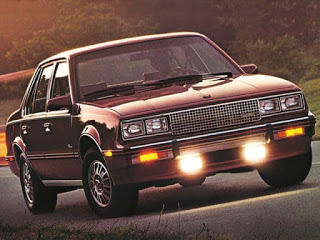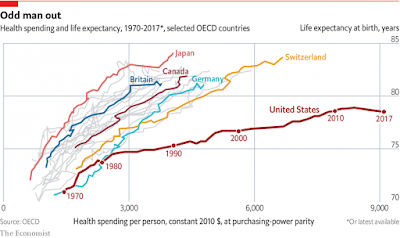U.S. Healthcare Is a Cadillac...Unfortunately
 Kim BellardThe good news: the U.S. healthcare is a Cadillac. The bad news: it's not an Escalade or even an XTS, it's a Cimarron, which is on most experts' list not only of the worst Cadillacs ever but also the worst cars ever -- expensive and poor quality. It was literally a Chevy Cavalier dressed up and trying to pretend to be a luxury car.
Kim BellardThe good news: the U.S. healthcare is a Cadillac. The bad news: it's not an Escalade or even an XTS, it's a Cimarron, which is on most experts' list not only of the worst Cadillacs ever but also the worst cars ever -- expensive and poor quality. It was literally a Chevy Cavalier dressed up and trying to pretend to be a luxury car.
You probably get the metaphor. There was a time when "Cadillac" was essentially a synonym for quality. Products aspired to be "the Cadillac of ____." It was a compliment of the highest order, understood worldwide. Foreign auto manufacturers tried to match its quality and make a dent into its market share. There was a time with U.S. healthcare had that kind of status too.
I remember when, as a child, my pediatrician made house calls in his Cadillac, marking the time both when Cadillacs were the car of choice for highly respected professionals and when doctors still made house calls. That's an era gone by; physician parking lots these days mostly have Audis, BMWs, Lexus, Mercedes, and maybe a Tesla or two. House calls have, for the most part, been gone longer than the Cimarron.
Cadillac suffered the fate of U.S. auto manufacturers generally. It didn't focus enough on quality and innovation, it didn't do enough to control its costs, and it wasn't prepared for the influx of well made, more efficient, more affordable cars from foreign competitors. Cadillac has certainly fought back, especially spurred by the success of its Escalade SUV in the early part of the century, but it is no longer the market leader in luxury vehicles, and only an optimist would predict that it will ever recover that position.
No one aspires to be the Cadillac of anything anymore, and saying that the U.S. healthcare system is the Cadillac of health systems is not a compliment. The ill-fated Cadillac CimarronAs is now well known, we spend way more than other countries -- in absolute dollars, in share of GDP, and per capita -- than other countries. Yet the health benefit of all that spending is not evident; our life expectancy numbers are nothing to brag about (and declining), our disease burden is higher, and our rates of death amenable to healthcare indicates we lag other countries in delivering timely and effective care. And, of course, we are far from universal coverage.
The ill-fated Cadillac CimarronAs is now well known, we spend way more than other countries -- in absolute dollars, in share of GDP, and per capita -- than other countries. Yet the health benefit of all that spending is not evident; our life expectancy numbers are nothing to brag about (and declining), our disease burden is higher, and our rates of death amenable to healthcare indicates we lag other countries in delivering timely and effective care. And, of course, we are far from universal coverage.
Whether it is Peterson-Kaiser Health System Tracker, The Commonwealth Fund, the OECD, or any number of other studies, our healthcare system comes across as that Cimarron -- overpriced, clunky, and unloved. It is not that there is not excellent care in the U.S.; some of the best care in the world is here. You just have to be in the right place, at the right time, with the right amount of money/insurance. If not, too bad. Performance is wildly uneven -- between states, metro areas, race/ethnicity, gender, and income.
In some ways, the U.S. healthcare system is much worse than Cadillac, because Cadillac never aspired to be the car for everyone. GM had its range of divisions, targeted at various socio-economic levels, with Cadillac at the top. With the exception of say, county hospitals, federally qualified health centers, or the VA (each of which has its own struggles), we like to sell our Cadillac healthcare system to everyone. As long as there are patient taxpayers for public programs like Medicare/Medicaid or plenty of healthy members for private health plans, our healthcare system could get away with expecting us to buy Cadillac-priced, Chevy Cavalier-quality healthcare. But taxpayers are running out of patience, as evidenced by our trillion dollar annual deficits and increasing numbers of (healthy) people opting to not buy health insurance (or buying skimpy versions).
As long as there are patient taxpayers for public programs like Medicare/Medicaid or plenty of healthy members for private health plans, our healthcare system could get away with expecting us to buy Cadillac-priced, Chevy Cavalier-quality healthcare. But taxpayers are running out of patience, as evidenced by our trillion dollar annual deficits and increasing numbers of (healthy) people opting to not buy health insurance (or buying skimpy versions).
Cadillac fooled a lot of people for a long time too, just because it was Cadillac.
We're not as lucky with healthcare as we were with cars, though. We can't just import other healthcare systems (although we do import about a quarter of our physicians). In fact, we're exporting aspects of our system, even our widely maligned EHRs. Yes, Singapore controls its costs pretty well, Switzerland has great outcomes, and Britain taught everyone about universal access, but none of them are setting up shop here. Our healthcare system thinks it can survive mostly as is despite all the evidence of its shortcomings.
It took Cadillac decades to reach its nadir with the Cimarron, and decades to recover. It makes, I'm told, some great cars these days, but it hasn't regained either its market share or its place as a symbol of excellence. Similarly, the U.S. healthcare system has been bemoaning its cost crisis for fifty years, and has been aware of it quality problems for almost as long (e.g., Wennberg) yet its performance continues to drift further away from that of health systems in other developed countries.
Despite HMOs, DRGs, ACOs, value-based care and other innovations, though, what hasn't happened in U.S. healthcare has been true acceptance that the "product" is deeply flawed, much less a clear strategy for making radical improvements to it.
It's not going to last. People found their way to buying foreign luxury cars, and those manufacturers figured out they could set up plants here to build their cars in the U.S. in order to sell even more. It will happen in healthcare too; probably not in the same way, but in some way. People will, at some point, seek higher quality and more affordable options, even in healthcare.
Outgoing medical tourism is booming, growing in the U.S. by as much as 25% per year. The late, great economist Uwe Reinhardt warned that: "medical tourism can do to the US health care system what the Japanese automotive industry did to American carmakers after the Japanese products developed a value for money and reliability reputation."
Perhaps more importantly, in an era of telemedicine, artificial intelligence, robotic procedures, and loads of digital health options, expecting U.S. borders to shield ideas and options from elsewhere in the world is as foolish as expecting car buyers would keep buying Cadillacs just because they were, well, Cadillacs.
Millennials, Gen X and Gen Y don't remember Cadillac as the symbol of excellence, and they haven't seen much about our healthcare system that they like either. If it wants to survive, our healthcare system better come up with something they want to pay for.
...
"U.S. Healthcare Is a Cadillac...Unfortunately" was authored by Kim Bellard and first published in his blog, From a Different Perspective.... It is reprinted by Open Health News with permission from the author. The original post can be found here.
- Login to post comments